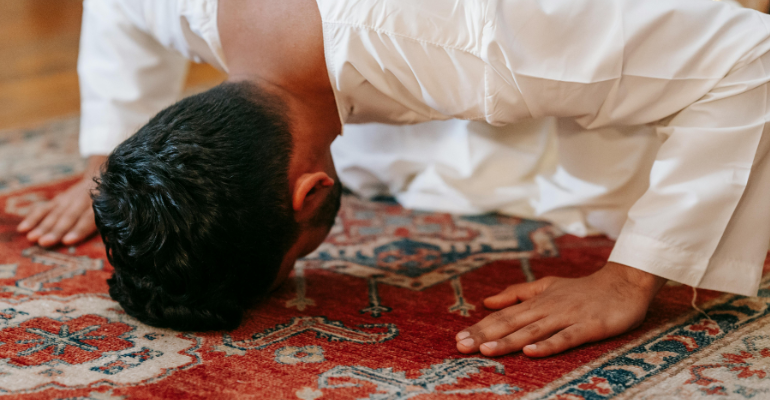Reference: Majmū’ Fatāwa wa Aaqālāt ash-Shaykh Ibn Bāz Vol 29 Page 217.
Question: I would like to inform your eminence that there are many brothers – may Allāh guide them – who pray ṣalāh whilst wearing a single garment below the stomach. As for the garment which is worn on the upper body, they place it on the floor or tie it around their stomach. I hope to convey [your answer to them]. Is their ṣalāh valid whilst they are exposing their back and stomach? This is repeated often. I hope I will find clarification regarding this, may Allāh reward you with goodness.
Response: The obligation upon a believer is to pray whilst wearing a lower garment and an upper garment, and making sure his shoulders – or at least one of them – are covered. If a person wants to pray, he must ensure the upper garment is covering his shoulders, or he wears a shirt if he is not in a state of Ihrām.
To summarise, the shoulders must be covered or at least one of them due to the saying of the Prophet ﷺ,
No one amongst you should pray in a single garment that does not cover a part of his shoulder. [1]
The Prophet ﷺ also ordered Jābir, radiAllāhu ‘anhu, to wrap his garment around his body and tie its ends upon his shoulders, if however he was not able to do say, he should wrap it around his lower body. [2]
The point from the above ḥadīth is that whenever a person is able to cover his shoulders or at least one of them, he is obligated to do so, he is not permitted to pray with his shoulders uncovered – as long as he is able to do so.
As for a person who is unable to do so, such as a person who only has a lower garment, his prayer is valid due to his inability. But the person who is fully able, such that he has a upper garment as well, must pray wearing the upper garment. If such a person prays with his shoulders uncovered, he should repeat the ṣalāh.
This is because the Prophet ﷺ said, ‘No one amongst you should pray in a single garment that does not cover a part of his shoulder.’ Whenever a matter is warned against, the base intent is that it is forbidden.
Some of the scholars indeed held this view, they said, ‘whoever prays ṣalāh whilst his shoulders are uncovered, and he has the ability to cover them, he is obligated to repeat the ṣalāh especially the fard ṣalāh due to its great importance.
It has also been conveyed to me that some people pray in very light clothes such as a see-through shirt, or shorts that expose his thighs; or he prays wearing a very light thobe. This is also prohibited. The obligation is that his pyjamas have to be covering [the lower body], or a thobe which covers or he wears an upper garment which covers to the things.
Alternatively, he wears pyjamas (i.e. a lower garment) which completely covers his thighs. It is not permitted to be negligent regarding this; ṣalāh is not valid in shorts or a very light thobe (i.e. see-through). And there is no power nor might except by Allāh.
Footnotes
[1] Narrated by Abu Hurayrah; Collected by al-Bukhārī & Muslim.
[2] Narrated by Jābir; Collected by al-Bukhārī.
Sa’īd ibn al-Ḥārith said, ‘I asked Jābir bin ‘Abdullah about praying in a single garment. He said, “I travelled with the Prophet ﷺ during some of his journeys, and I came to him at night for some purpose and I found him praying. At that time, I was wearing a single garment with which I covered my shoulders and prayed by his side. When he finished the prayer, he asked, ‘O Jābir, what has brought you here?’ I told him what I wanted. When I finished, he asked, ‘O Jābir, what is this garment which I have seen and with which you covered your shoulders?’ I replied, ‘It is a (tight) garment.’ He said, ‘If the garment is large enough, wrap it around the body (covering the shoulders) and if it is tight (too short) then use it as an Izār (tie it around your waist only.)’ “
العنوان:حكم من صلى وليس على أحد عاتقيه ثوب
المرجع: مجموع فتاوى ومقالات الشيخ ابن باز 29/217
السؤال أفيد سماحتكم أنه يوجد كثير من الإخوان هداهم الله يصلون الصلاة وهم في إزار واحد وهو الذي أسفل البطن، أما الإزار الذي على الظهر فإنهم ينزلونه في الأرض أو يربطونه على بطونهم، فأرجو إبلاغهم، هل صلاتهم صحيحة وهم مكشوفو الأظهر والبطون وهذا كثير ومتكرر؟ فأرجو إفتائي في ذلك جزاكم الله خيرا.
الجواب: الواجب على المؤمن أن يصلي في إزار ورداء لا بد أن يكون على عاتقيه أو أحدهما شيء، فإذا أراد الدخول في الصلاة فالواجب أنه يجعل الرداء على عاتقيه، أو يلبس قميصًا إذا كان في غير الإحرام، فالمقصود أنه لا بد من ستر العاتقين، أو أحدهما كما قال النبي ﷺ: لا يصلي أحدكم في الثوب الواحد ليس على عاتقه منه شيء ، وقال ﷺ لجابر في الحديث: وأمره أن يلتحف بثوبه ويجعل أطرافه على عاتقيه فإن لم يقدر على ذلك اتزر بهأمره أن يلتحف به إن قدر وإلا اتزر به.
فالحاصل أنه متى استطاع أن يغطى عاتقيه أو أحدهما وجب عليه ذلك، وليس له أن يصلى وعاتقاه مكشوفان وهو يقدر.أما العاجز الذي ما عنده إلا إزار لعجزه فصلاته صحيحة، أما الذي ليس بعاجز بل عنده رداء فإنه يصلي في رداء، وإذا صلى وهو مكشوف العاتقين فينبغي له أن يعيد؛ لأن الرسول ﷺ قال: لا يصلي أحدكم في الثوب الواحد ليس على عاتقيه منه شيء والأصل في النهي التحريم، وقد ذهب إلى هذا بعض أهل العلم فقالوا: من صلى وعاتقاه مكشوفان وهو يقدر فعليه الإعادة ولا سيما الفريضة فإن أمرها عظيم.
كذلك بعض الناس فيما بلغني قد يصلي في ثياب رقاق عليه قميص رقيق وسراويل قصيرة، ويبدو فخذه ويصلي تحت الثوب الرقيق، هذا أيضا لا يجوز، فالواجب أن تكون السراويل ساترة أو الثوب ساترا ويلبس قميصًا ساترا لفخذيه؛ وإما أن يكون عليه سراويل ساترة وافية تستر فخذيه، ولا يجوز التساهل في هذا الأمر، ولا الصلاة في سراويل قصيرة وفي ثوب رقيق. والله المستعان ولا حول ولا قوة إلا بالله.


